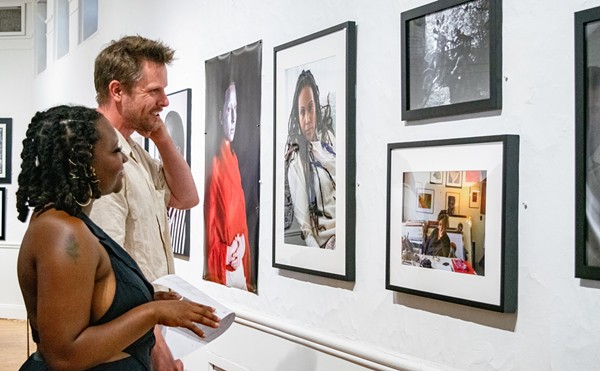It was June 1974 when Wilma Johnson heard the voice of the Lord telling her to do his will. "And that’s what I did," she says. "I knew it was a commandment. I had no choice, no questions."
For Johnson, the Lord’s will was that she enter the ministry – a path which was then an unconventional road for a woman. But despite the potholes and speed bumps, she’s followed this path to her new role as pastor of Detroit’s 1,000-member New Prospect Baptist Church.
Detroit residents are touting the 47-year-old’s appointment as the first female pastor of a major black Baptist church. It’s a role Johnson has earned. She’s been preaching for 24 years, and prior to her appointment at New Prospect, she was assistant pastor to Dr. Charles Adams at the renowned Hartford Memorial Baptist Church.
Johnson tries to deflect the attention away from herself as a female minister, but at the same time, that same attention speaks to the significance of her feat. It is almost unheard of for a woman to lead a Baptist church. Johnson modestly says she can’t understand all the hype, but anyone attending a Baptist church can.
"The real story is that New Prospect had the courage and faith to say yes to a female minister," she says, adding that most of her opposition comes from other Baptist ministers who refuse to allow woman ministers to speak from the pulpit, and instead insist they speak from the floor.
"I’ve never been concerned with opposition," says Johnson. "It doesn’t change what I am or what I am called to do."
As a woman minister, she doesn’t expect to change the worship service to focus more on women in the Bible in order to support or legitimize her calling. "I certainly hope people are coming for one reason – to worship the Lord and be fed," says Johnson. "My sermon is about the gospel."
Dirk Gill, who occasionally visits services at New Prospect, says he would gladly join a church led by a woman. "It’s a different perspective in a male-dominated profession," he says. "I think it’s time for a shake-up and time to add some flavor."
According to federal labor statistics, the number of women describing themselves as "clergy" increased from 16,408 in 1983 to 43,542 in 1996. As more women enter the ministry, the nature of the church and its services is subtly changing to a less hierarchical, more inclusive environment.
Although the Methodist church has ordained women since 1956, the Rev. Faye McKinstry of Madison Heights United Methodist Church says women have been preaching the gospel since biblical times. "Mary Magdalene was the first evangelist to (preach to) scared male disciples," she says.
Over the 10 years McKinstry, 50, has been an ordained minister, she has seen more women become interested in the ministry and more congregation members embrace women as leaders.
McKinstry says being a woman pastor has its advantages, especially when relating to congregations.
"I think seeing women as pastors empowers women," she says.
In some ways, she has become a role model. Her parishioners often tell her their daughters are more interested in attending church and pursuing leadership positions, thanks to her role in their lives.
"My being a woman offers a totally different atmosphere," says McKinstry. "I am more compassionate, and maybe a mothering image."
Gloria Albrecht, associate professor of religious studies at the University of Detroit, says a key difference between men and women as ministers is that women tend to exercise the authority of the ministry in a different way. They tend to be more collegial, less hierarchical, and more geared toward trying to create communities among members of the congregation.
According to Johnson, "We’ve always been nurturing, caring, teaching and preaching – even though it wasn’t called that."
Along with this compassion comes an ease and acceptance of touching and hugging children, which is a definite advantage of being a woman: As McKinstry admits, a male pastor who touches, hugs and kisses children might make parents uncomfortable.
McKinstry thinks churches are seeing more women decide to pursue the ministry as a career because society is starting to recognize women’s abilities in the areas of preaching and teaching.
"God can use all persons to share his love and grace," McKinstry says.
According to Albrecht, the rise of women in the pulpit is due to the fact that many church denominations are starting to recognize the legitimacy of the spiritual call to women in the ministry, and the changing roles women play in our culture.
"Denominations are reassessing the appropriate roles for women and beginning to appreciate that God is indeed calling women to the ministry," says Albrecht. "People can’t deny women have the gift."
Although her sheep are open to being led by a woman minister, McKinstry readily acknowledges that being a woman minister in the Methodist church often means that your assigned flock will be a lot smaller than that assigned to a male minister.
In the Methodist church, women are often assigned to smaller church congregations, with 200-250 members. McKinstry’s Madison Heights United Methodist has 132 members.
Still, there’s no doubt that these women have loyal followers. "I have no problems with a female minister as long as the enthusiasm and the love for Christ is there," says Dan Bookout, a member of McKinstry’s congregation. "The only difference is the voice."
Given this acceptance, and the possibilities it unveils, the church is likely to see many more women in its pulpits in the future.
Johnson says, "Women are now more determined to do what they were called to do. Women have just stepped out on faith regardless of what anyone thinks. They are unafraid and more aware that they are equipped to do whatever ministry they were assigned to do."
As McKinstry adds, the ministry is probably one of the last fields to allow women, but for that she has one solution: "We need to allow God to be God and allow who He wants to spread the ministry."





